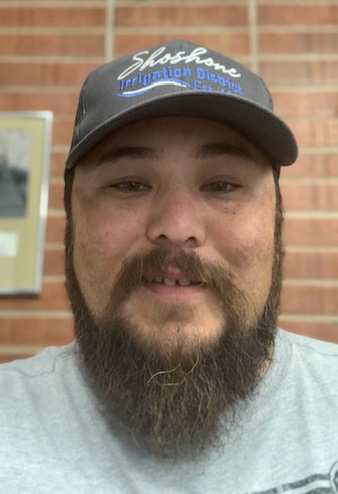Years working in irrigation: 19½
Years as manager: 1½
Number of employees: 13
Size of service area in acres: 36,000
Amount of water diverted for irrigation per year in acre-feet: 145,000
Main crops irrigated: Malt, barley, sugar beets, alfalfa seed, corn, hay
Predominant irrigation methods: Flood
 Irrigation Leader: What is the top issue facing your irrigation district today?
Irrigation Leader: What is the top issue facing your irrigation district today?
Trent Reed: Our irrigation district is over 100 years old. We started delivering water in 1908. We’ve been proactive about replacing aging structures for the last 30-40 years now. We do have some original structures, including the Corbett Tunnel, which is of special concern after the recent tunnel collapse in an irrigation district in the southern part of Wyoming. We are having ground-penetrating radar scans done on the tunnel this winter to assess its structural integrity.
Irrigation Leader: What future issues are you preparing for?
Trent Reed: Urban sprawl and urbanization are making agriculture tougher. People are subdividing land into smaller parcels, so we have more water users on the same acreage. Instead of having, say, 1 person on an 80-acre irrigation unit, you’ll have 2–4 people. People may buy 10 or so acres of land and run cows and horses on it, but they’re no longer dedicating the land to production agriculture. This affects our services because there are more people who want time with us.
Irrigation Leader: What are your top issues regarding personnel?
Trent Reed: I’ve been lucky in finding good, qualified help and responsive ditch riders.
Irrigation Leader: What training do you currently provide your employees?
Trent Reed: We have training on dealing with people and various other topics every spring for employees, as well as regular safety trainings. As far as managerial training, we go to an annual state association meeting for irrigation and water. We’re also looking at going to some trade shows.
Irrigation Leader: How much do you spend on training for your employees each year?
Trent Reed: Around $1,500.
Irrigation Leader: What is the most important thing you have learned as manager?
Trent Reed: Communication is the biggest thing. You need to be able to communicate with water users, landowners, and employees.
Irrigation Leader: What are the top skills needed to be a successful manager?
Trent Reed: Having a background in irrigation and water, having people skills, and being able to communicate.
Trent Reed is general manager of the Shoshone Irrigation District in Powell, Wyoming. He can be contacted at shoshoneid@hotmail.com or (307) 754-5741.
